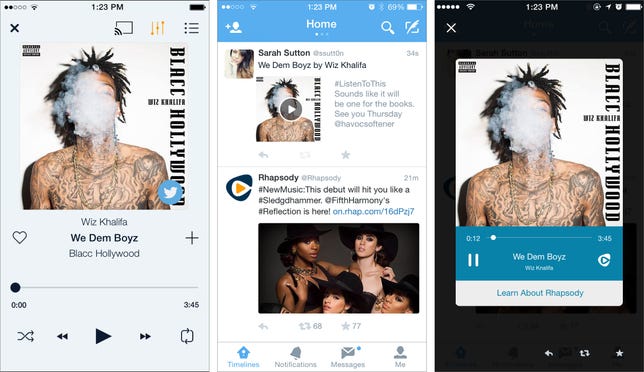
Rhapsody
Twitter is about to get louder, for longer.
The subscription-driven music service Rhapsody will allow its subscribers to share full songs on Twitter starting Tuesday, making it the first paid streaming music service to offer whole-track playback directly from a tweet. Followers on Twitter can listen to the song, regardless of whether they subscribe.
With the heyday of the mixtape and CD now past, “we’re really really challenged to find a way to bring back music discovery,” said Rhapsody International Chief Financial Officer Ethan Rudin. “We’re making music social again.”
As the market shifts to streaming options from paid ownership of music, technology companies and the music industry have grappled to reconcile the consumer trend with how to pay artists, labels and tech providers enough money to sustain a new business model in the long term.
Rhapsody Premier, the company’s on-demand subscription offering, is $9.99 a month, while its more limited UnRadio service is $4.99 a month. Twitter full-song playback works only in the US initially, and Rhapsody’s full catalog of 32 million tracks is available to share.
This is not the first venture by music-related tech companies into the Twittersphere. In October, Twitter launched “audio cards” that allow native playback of sound. To kick off the feature, Apple used audio cards to let artists tweet a song preview and a link to the iTunes store to buy it, and user-generated-music site Soundcloud allowed some creators to share audio in their followers’ timelines.
However, Rhapsody’s announcement Tuesday on the sidelines of the the South by Southwest festival in Austin, Texas, marks the first time a paid subscription music service has fostered sharing of full tracks on Twitter. The tracks are fully licensed, so even free listening by nonsubscribers will pay a royalty to the artists and labels.
“Music has been a bit of red-headed stepchild” on social, Rudin said. He said the company has received a high level of interest from artists and labels.
The Rhapsody full-track sharing is an “experiment,” according to Rudin. It’s rolling out to take advantage of the musical and technological bent to the SXSW festival this week, but he said he’d like the program to continue indefinitely, provided it meets no protests from labels and artists.
Rhapsody was a pioneer of the subscription streaming model, originating the format in 2001. But as the format has begun to gain widespread consumer traction in recent years, Rhapsody has been one of many competitors vying for attention in the busy space, alongside the likes of rapidly growing Spotify; marketing powerhouse Beats Music, acquired by Apple for $3 billion; and streaming services from giants like Google and Amazon. Rhapsody has more than 2.5 million subscribers; Spotify, by comparison, has more than 15 million paid members.
Rubin said he’s hopeful the Twitter integration will bring more people into Rhapsody’s service. “It’s a continuation of Rhapsody’s original spirit,” he said.




